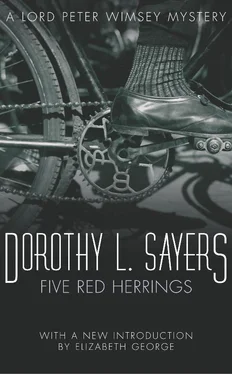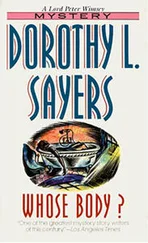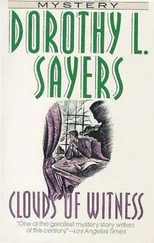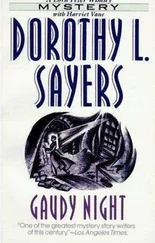Wimsey pulled up as he came to the second bridge and the rusty gate, and drew the car on to the grass. There were other cars there, and glancing along to the left he saw a little group of men gathered on the edge of the burn forty or fifty yards from the road. He approached by way of a little sheep-track, and found himself standing on the edge of a scarp of granite that shelved steeply down to the noisy waters of the Minnoch. Beside him, close to the edge of the rock, stood a sketching easel, with a stool and a palette. Down below, at the edge of a clear brown pool, fringed with knotted hawthorns lay something humped and dismal, over which two or three people were bending.
A man, who might have been a crofter, greeted Wimsey with a kind of cautious excitement.
‘He’s doon there, sir. Ay, he’ll juist ha’ slippit over the edge. Yon’s Sergeant Dalziel and Constable Ross, mekkin’ their investigation the noo.’
There seemed little doubt how the accident had happened. On the easel was a painting, half, or more than half finished, still wet and shining. Wimsey could imagine the artist getting up, standing away to view what he had done — stepping farther back towards the treacherous granite slope. Then the scrape of a heel on the smooth stone, the desperate effort to recover, the slither of leather on the baked short grass, the stagger, the fall, and the bump, bump, bump of the tumbling body, sheer down the stone face of the ravine to where the pointed rocks grinned like teeth among the chuckling water.
‘I know the man,’ said Wimsey. ‘It’s a very nasty thing, isn’t it? I’ll think I’ll go down and have a look.’
‘Ye’ll mind your footing,’ said the crofter.
‘I certainly will,’ said Wimsey, clambering crablike among the stones and bracken. ‘I don’t want to make another police-exhibit.’
The Sergeant looked up at the sound of Wimsey’s scrambling approach. They had met already, and Dalziel was prepared for Wimsey’s interest in corpses, however commonplace the circumstances.
‘Hech, my lord,’ said he, cheerfully. ‘I dooted ye’d be here before verra long. Ye’ll know Dr. Cameron, maybe?’
Wimsey shook hands with the doctor — a lanky man with a non-committal face — and asked how they were getting on with the business.
‘Och, well, I’ve examined him,’ said the doctor. ‘He’s dead beyond a doubt — been dead some hours, too. The rigor, ye see, is well developed.’
‘Was he drowned?’
‘I cannot be certain about that. But my opinion — mind ye, it is only my opinion — is that he was not. The bones of the temple are fractured, and I would be inclined to say he got his death in falling or in striking the stones in the burn. But I cannot make a definite pronouncement, you understand, till I have had an autopsy and seen if there is any water in his lungs.’
‘Quite so,’ said Wimsey. ‘The bump on the head might only have made him unconscious, and the actual cause of death might be drowning.’
‘That is so. When we first saw him, he was lying with his mouth under water, but that might very well come from washing about in the scour of the burn. There are certain abrasions on the hands and head, some of which are — again in my opinion — post-mortem injuries. See here — and here.’
The doctor turned the corpse over, to point out the marks in question. It moved all of a piece, crouched and bundled together, as though it had stiffened in the act of hiding its face from the brutal teeth of the rocks.
‘But here’s where he got the big dunt,’ added the doctor. He guided Wimsey’s fingers to Campbell’s left temple, and Wimsey felt the bone give under his light pressure.
‘Nature has left the brain ill-provided in those parts,’ remarked Dr. Cameron. ‘The skull there is remarkably thin, and a comparatively trifling blow will crush it like an egg-shell.’
Wimsey nodded. His fine, long fingers were gently exploring head and limbs. The doctor watched him with grave approval.
‘Man,’ he said, ‘ye’d make a fine surgeon. Providence has given ye the hands for it.’
‘But not the head,’ said Wimsey, laughing. ‘Yes, he’s got knocked about a bit. I don’t wonder, coming down that bank full tilt.’
‘Ay, it’s a dangerous place,’ said the Sergeant. ‘Weel, noo, doctor, I’m thinkin’ we’ve seen a’ that’s to be seen doon here. We would better be getting the body up to the car.’
‘I’ll go back and have a look at the painting,’ said Wimsey, ‘unless I can help you with the lifting. I don’t want to be in the way.’
‘Nay, nay,’ said the Sergeant. ‘Thank you for the offer, my lord, but we can manage fine by oorsel’s.’
The Sergeant and a constable bent over and seized the body. Wimsey waited to see that they required no assistance, and then scrambled up to the top of the bank again.
He gave his first attention to the picture. It was blocked in with a free and swift hand, and lacked the finishing touches, but it was even so a striking piece of work, bold in its masses and chiaroscuro, and strongly laid on with the knife. It showed a morning lighting — he remembered that Campbell had been seen painting a little after 10 o’clock. The grey stone bridge lay cool in the golden light, and the berries of a rowan-tree, good against witchcraft, hung yellow and red against it, casting splashes of red reflection upon the brown and white of the tumbling water beneath. Up on the left, the hills soared away in veil on veil of misty blue to meet the hazy sky. And splashed against the blue stood the great gold splendour of the bracken, flung in by spadefuls of pure reds and yellows.
Idly, Wimsey picked up the palette and painting-knife which lay upon the stool. He noticed that Campbell used a simple palette of few colours, and this pleased him, for he liked to see economy of means allied with richness of result. On the ground was an aged satchel, which had evidently seen long service. Rather from habit than with any eye to deduction, he made an inventory of its contents.
In the main compartment he found a small flask of whiskey, half-full, a thick tumbler and a packet of bread and cheese, eight brushes, tied together with a dejected piece of linen which had once been a handkerchief but was now dragging out a dishonoured existence as a paint-rag, a dozen loose brushes, two more painting-knives and a scraper. Cheek by jowl with these were a number of tubes of paint. Wimsey laid them out side by side on the granite, like a row of little corpses.
There was a half-pound tube of vermilion spectrum, new, clean and almost unused, a studio-size tube of ultramarine No. 2, half-full, another of chrome yellow, nearly full, and another of the same, practically empty. Then came a half-pound tube of viridian, half-full, a studio-size cobalt three-quarters empty, and then an extremely dirty tube, with its label gone, which seemed to have survived much wear and tear without losing much of its contents. Wimsey removed the cap and diagnosed it as crimson lake. Finally, there was an almost empty studio-size tube of rose madder, and a half-pound lemon yellow, partly used and very dirty.
Wimsey considered this collection for a moment and then dived confidently into the satchel again. The large compartment, however, yielded nothing further except some dried heather, a few shreds of tobacco and a quantity of crumbs, and he turned his attention to the two smaller compartments.
In the first of these was, first, a small screw of greaseproof paper on which brushes had been wiped; next, a repellent little tin, very sticky about the screw-cap, containing copal medium; and, thirdly, a battered dipper, matching the one attached to the palette.
The third and last compartment of the satchel offered a more varied bag. There was a Swan Vesta box, filled with charcoal, a cigarette-tin, also containing charcoal and a number of sticks of red chalk, a small sketch-book, heavily stained with oil, three or four canvas-separators, on which Wimsey promptly pricked his fingers, some wine-corks and a packet of cigarettes.
Читать дальше












